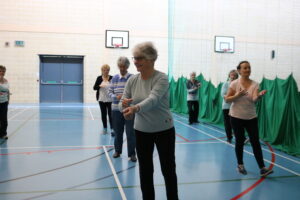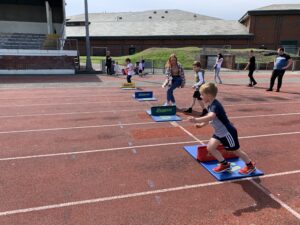Since 2016, Spirit of 2012 has been working with Activity Alliance and their partners across the UK to get disabled and non-disabled people active together. Alex Johnston reflects on how the Get Out Get Active (GOGA) inclusive approach to sport and physical activity has successfully engaged inactive people and helped them on their active journey.

Reaching inactive people through inclusion – the GOGA way

As someone who runs, plays football and likes to get a sweat on, I understand the benefits of being active on people’s physical, mental and social wellbeing. But I know that becoming active isn’t always easy. For inactive people there are many barriers.
The UK population is now more physically inactive than at any time in history. Today, 14.5 million UK adults, nearly 28% of the UK population, are classed as physically inactive. Disabled people are twice as likely to be physically inactive compared to those without a disability
Spirit of 2012 has invested in a number of successful grassroots initiatives that have sustained impact in getting the least active to become more active, and stay active. What characterises this successful work is a strong focus on people and taking a person-centred approach which is tailored to individual differences and needs, and taking an inclusive approach which brings disabled and non-disabled people together.

Inactive people are not one homogenous group. Programmes such as GOGA have, at their core, a focus on understanding the different barriers to participation as well as learning from the commonalities. But everyone is different, and some people may face a few or no barriers to being active, while others may face substantial hurdles.
GOGA is a programme created to bring disabled and non-disabled people together to be active, directing attention to the least active communities. GOGA shows us that being active together and reaching the least active go hand-in-hand, it’s not one or the other. This focus ensures that the true power of accessible and inclusive activity is realised, meaning we can tackle inequality around access to activity directly. GOGA achieves this by working with communities, focussing on engagement over rushing into delivery, striving to achieve outcomes as opposed to numbers, and not being afraid to try different things where traditional approaches have failed.
And GOGA works!

GOGA is on target to reach 40,000 people across the UK by 2023, with 7 in 10 participants in the programme being classified as physically inactive. Retention data shows that 2 out of 3 participants are sustaining their increased levels of physical activity during and after the programme. GOGA participants have told us they feel better, both physically and mentally, with increases in wellbeing and decreases in anxiety. A social return on investment analysis showed that GOGA was delivering an impressive £8.83 return on every £1 spent.
So…
Choose the GOGA way if you want to put inclusion and fun at the heart of sport and physical activity.
Choose the GOGA way if you want to reach the least active communities and make them feel healthier and happier.
Choose the GOGA way if you want to do things differently to reach and impact those who will benefit the most from being active.
Come and join Spirit of 2012, Sport England and London Marathon Charitable Trust and support the GOGA way by becoming investors and advocates of inclusive practice: fully inclusive opportunities to be active are essential if we want to continually improve national activity levels.
Further information
Get Out Get Active project page
Did the London 2012 Paralympic Games change things for disabled people?
With a focus on people and targeted, sustained investment, the legacy from major sporting events can deliver participation
Get Out Get Active launches new campaign to help organisations in reducing inactivity
